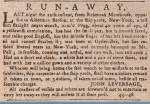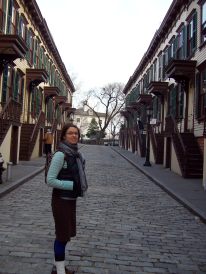Research begins – Program Directors, Risa Gilpin and SueEllen Kroll visit NYC Jan. 6-8,2008
SueEllen at Sylvan Terrace – 160th St
Row Houses built 1882
Upon arriving in NYC on Sunday, Jan. 6, Risa and Sue headed straight up to the Sugar Hill section of Harlem – to Sylvan Terrace and Jumel Terrace.  We were on a pilgrimage of sorts to this little neighborhood bookshop Jumel Terrace Books (426 W. 160th St “Where the Founding Fathers meet the Founding Brothers”) specializing in the Black Atlantic, Harlem Renaissance, and civil rights literature. Owner Kurt Thometz long-time collector of Africana and African American books and author of Life Turns Man Up and Down, welcomed us to his shop and offered some concrete recommendations for our initiative. Along with his friend and neighbor, George Preston (Beat Poet who opened Artist’s Studio on E. 3rd; taught African art at City College for 32 years; opened the Museum of Art & Origins in his home; author of Sets, Series, Ensembles in African Art), and jazz musician Marjorie Elliot’s (555 Edgecombe Ave. who holds Sunday afternoon jam sessions) are locally known as “the new Sugar Hill gang.”
We were on a pilgrimage of sorts to this little neighborhood bookshop Jumel Terrace Books (426 W. 160th St “Where the Founding Fathers meet the Founding Brothers”) specializing in the Black Atlantic, Harlem Renaissance, and civil rights literature. Owner Kurt Thometz long-time collector of Africana and African American books and author of Life Turns Man Up and Down, welcomed us to his shop and offered some concrete recommendations for our initiative. Along with his friend and neighbor, George Preston (Beat Poet who opened Artist’s Studio on E. 3rd; taught African art at City College for 32 years; opened the Museum of Art & Origins in his home; author of Sets, Series, Ensembles in African Art), and jazz musician Marjorie Elliot’s (555 Edgecombe Ave. who holds Sunday afternoon jam sessions) are locally known as “the new Sugar Hill gang.”
Kurt Thometz
More about Jumel Terrace Books…
New York Historical Society Gives Us the Dish
 The next stop on our party train was the New York Historical Society to meet with Adrienne Kupper, vice president of education, and Elizabeth Grant, associate director of education, to hear more about their experiences working on the major exhibitions Slavery in New York, Legacies- Contemporary Artists Reflect on Slavery 2006, and New York Divided.
The next stop on our party train was the New York Historical Society to meet with Adrienne Kupper, vice president of education, and Elizabeth Grant, associate director of education, to hear more about their experiences working on the major exhibitions Slavery in New York, Legacies- Contemporary Artists Reflect on Slavery 2006, and New York Divided.
The curriculum produced by NYHS is not only impressive but inspirational as a benchmark of excellence. Kupper and Grant offered several pieces of advice for us: 1) consider working with a clinical psychologist to provide a forum to talk about fears, identity politics, adverse reactions, steering conversations, etc; 2) anticipate what some of the toughest questions or reactions will be and plan for strong, consistent responses; 3) plan for the long-term if we want to have an impact; 4) providing teacher trainings and curricula is a sure way to have (measurable) impact; 5) can we create a permanent exhibit?; 6) video booth set up to capture visitors reactions to exhibit was extremely compelling tool; 7) they will share their current evaluation efforts of their curricula in NY public schools with us.
This work could potentially provide a model for our grantees seeking to provide curricular materials for teachers; engage students in after-school projects, etc.
We have a copy of the binder they created for teachers and are willing to share with anyone interested (included are maps, posters, a cd-rom, and innovative techniques for creating portraits of local African American people, using primary source material).
Visit New York Historical Website…
Connecting with Scholar/Historian James Basker
Next on our trip was a stop with James Basker, professor of history at Barnard College, president of the Gilder Lehrman Institute , author of Amazing Grace: An Anthology of Poems About Slavery, 1660-1810, editor of Early American Abolitionists: A Collection of Anti-Slavery Writings 1760-1820.
Much of Jim’s work for Gilder-Lehrman has been focused on education- annual teacher seminars; traveling exhibits; and classroom resources such as calendars, posters – all of which he has offered to make available for RICH should we make reach into the schools a priority. In addition, Jim had several great suggestions for keynotes/panelists for our OTRTF conference.
The Institute launched the African American National Biography project of Henry Louis Gates and Evelyn Brooks Higginbotham,
http://www.fas.harvard.edu/~aanb/
Read Basker Article on Poets Against Slavery in the 1600’s and 1700’s www.time.com/time/sampler/article/0,8599,423930,00.html
Up Next: Angela Keiser at Gilder-Lehrman Center for the Study of Slavery, Resistance and Abolition, Yale University! http://www.yale.edu/glc/
Good thing that Sue and Risa didn’t sleep in because the next stop on our whirlwind tour proved to be the most fruitful. In her capacity as Special Projects Coordinator, Angela Keiser spearheads planning and growth for the GLC’s major education outreach program – the UNESCO Transatlantic Slave Trade Education Project. As the TST Project New England Regional Coordinator, Angela works directly with education policy makers, university leaders, school system administrators, middle and upper grade teachers to elevate the quality of instruction in the origins, evolution and legacy of the transatlantic slave trade and to promote intercultural student dialogue around this topic.
Angela offered several resources and key pieces of advice in terms of planning our initiative: 1) Timing for this project is excellent in terms of receptivity. 2) Build a strong alliance with State Department of Education. 3) Need for Digital Humanities Resource Center for connecting resources/scholarship. 4) Involve non-academic institutions e.g., Projo to help spread the word (see Hartford Courant’s Coverage). 5) Move beyond the “blaming” issue. It’s crucial to have a plan to move conversations to healing and resolution. 6) Work with Katrina Browne as she is providing a white audience with a vocabulary for talking about these tough issues. 7) Understand that there is a psychological aspect to addressing this issue (not just a humanities one).
Also check out these websites:
Citizens All: African Americans in Connecticut, 1700-1850 website link here http://cmi2.yale.edu/citizens_all/
Beyond Complicity: Connecticut’s Hidden History http://www.courant.com/news/local/northeast/hc-bunceintro.artapr03,0,407447.htmlstory?coll=hc-headlines-custom-specials
Last Stop: The Road to Civil War
We concluded our trip with a lunch meeting at Yale’s Lawn Club with film producer H. Gilles Carter to discuss his upcoming PBS project – a 3 part series examining the period leading up to the Civil War.
Gilles is interested in applying for a grant, and among the RI connections to his research, is the story of the abolitionists known as the Grimke Sisters who were active at the Beneficent Congregational Church.
Gilles is working with Richard Wormser on this production who directed the PBS series The Rise and Fall of Jim Crow. They intend to model their current project off of this one.
Visit Rise and Fall of Jim Crow Resource Website…http://www.pbs.org/wnet/jimcrow/

